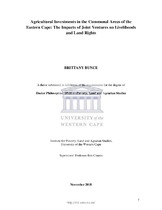Agricultural investments in the communal areas of the Eastern Cape: The impacts of joint ventures on livelihoods and land rights
Abstract
A major and unresolved challenge facing South Africa’s post-apartheid government, is how best to overcome the historical injustices of land dispossession and the resultant poverty now found in the communal areas of the former 'homelands'. In line with the South African government’s hybrid of neo-liberal and social welfare approaches to development, one important strategy for addressing these challenges has so far been the promotion of inclusive business models such as joint ventures (JVs), especially in the context of land restitution claims, but also in communal areas. This study explores the impacts of the JV model on livelihoods and land rights and use, and engages with key debates regarding the dynamics of class formation in the former 'homelands' of South Africa.
The study undertakes a comparative analysis of two Joint Venture (JV) dairy farms, involving the same agribusiness partner, Amadlelo Agri. The farms are located on irrigation schemes in the former Ciskei of South Africa’s Eastern Cape Province. The JVs involve residents from the rural settlements of Keiskammahoek and Shiloh, as both landowners and workers. The comparative case study presented here illustrates quite divergent outcomes when the same JV model is implemented in different rural settlements, most powerfully because of differences in the class structure of each settlement.
Class analysis helps to explain the more intense intragroup conflicts that have emerged around the JV in Shiloh. Intragroup dynamics and conflicts, which have historical roots extending beyond the implementation of the JV intervention, are also critical to understanding divergent outcomes. A class-analytic approach assists in understanding the tensions that the JV model of capitalist farming generates in relation to household reproduction, in a class-differentiated manner.
The sole focus in much of the literature on agricultural investments has been on relationships between agribusiness, and what are too often portrayed as homogenous 'communities’. However, this thesis illustrates that this approach is misleading when applied to analysis of the real politics on the ground. Struggles over jobs, dividends and land take place within highly differentiated communities. Investigating the inter- and intra-household distribution of JV benefits and risks is central to understanding the impacts of the JV on livelihoods and incomes, and also the emerging contentions and conflicts. To this end, I explore how class interacts with other aspects of social difference, particularly gender, kinship, ethnicity, race, generation and religious affiliation.
A class-analytic approach is significant because it illuminates the emerging agrarian class structure that a JV-type intervention both reflects and in turn conditions, in dialectical fashion. It thus allows exploration of the implications of the JV model for wider processes of agrarian change in South Africa. Although there is evidence of livelihood benefits being derived by some households, as well as limited opportunities for accumulation, the JV model does not appear to stimulate the emergence of a class of productive black farmers. Significantly, the study could not identify any households as 'middle farmers', reliant on 'accumulation from below', which many authors consider to be a more progressive, dynamic and desirable pathway of agrarian reform. The JV model is at risk of equating ‘black emerging farmers’ with a group of customary landowners, who are in reality workers and 'passive recipients' of JV dividends and land rents.

